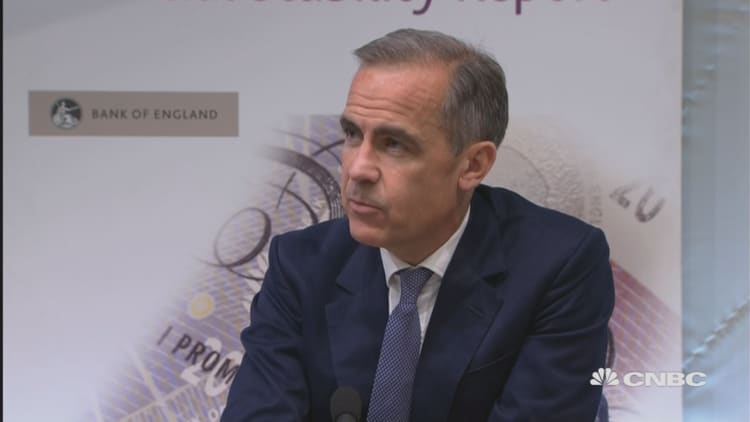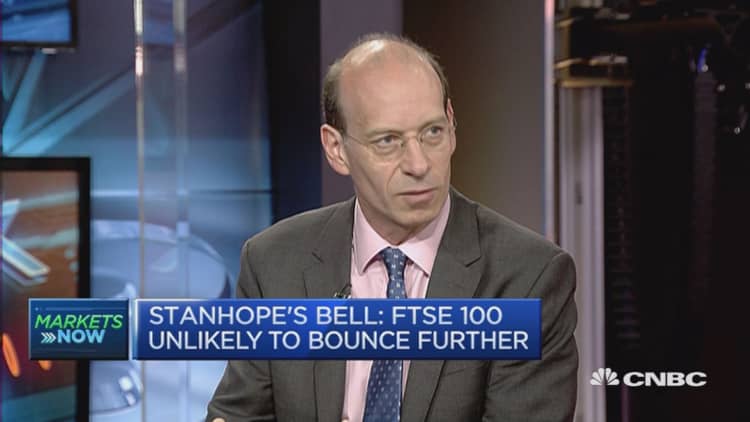


The news that Standard Life, Aviva and M&G Investments have suspended dealing in their U.K. property funds has both investors and fund managers worried about the consequences on the broader sector.
Shares of Standard Life were down nearly 5 percent on Tuesday. Meanwhile, shares across other asset management companies were sharply negative too. Aberdeen Asset Management saw its shares down nearly 8 percent, while Schroders was down nearly 6 percent.
Standard Life was the first to announce suspension on Monday. Aviva Investors and M&G Investments followed the lead to announce a temporary suspension on Tuesday. All three companies have attributed the decision to a massive increase in investor redemptions because of high levels of uncertainty in the U.K. commercial property since the outcome of the referendum on June 23.
While all three companies have claimed that the decision was taken in order to protect the interests of investors who may be negatively impacted by this, the fear that this may be followed by more property funds has started to worry many.
"Redemptions have now reached a point where M&G believes it can best protect the interests of the funds' shareholders by seeking a temporary suspension in trading. This will allow the fund manager time to raise cash levels in a controlled manner, ensuring that any asset disposals are achieved at reasonable values," M&G said in a statement.
'Exceptional market circumstances'
Meanwhile, Standard Life in a statement said the decision to suspend trading in the real estate fund and its associated feeder funds from midday on Monday was taken due to "exceptional market circumstances". Aviva Investors echoed the same reason for suspension of dealing in their £1.8 billion property fund in an official statement.
"The decision was taken following an increase in redemption requests as a result of uncertainty for the U.K. commercial real estate market following the EU referendum result," Standard Life said. "The suspension was requested to protect the interests of all investors in the fund and to avoid compromising investment returns from the range, mix and quality of assets within the portfolio."
Standard Life further explained that unlike investing in equities, the selling process for real estate is sometimes lengthy as the fund manager needs to offer assets for sale and find prospective buyers. This process can take time.
Jonathan Bell, chief investment officer at Stanhope Capital told CNBC on Tuesday that the problem lies both in the property business and low earnings growth.
"The issue you have got is a lot of these companies cannot generate the earnings growth and on the insurance side you have got buying assets giving you very little yield and then on top of that you have got this current concern on the property business. I would have thought that is a short term-concern, you are going to carry on getting the yield but whether you are going to get growth as well is another issue," he said.
Shockwaves in markets
The decision by the U.K. to exit the EU has sent shockwaves across global markets. Stocks and sterling saw a massive sell-off in the days after the vote was announced. While the market tested a rally in the past week, analysts called the move a "dead cat bounce." The ongoing volatility in the markets has had a negative impact on retail funds that have seen massive outflows.
Property as an investment can be made either by physically purchasing a house or through Real Estate Investment Trusts (REITs) provided by funds. While this offers a diversification in an investment portfolio, they sometimes tend to see more challenges due to the nature of the real estate market in the U.K.
"Property funds are clearly under pressure as a result of the Brexit vote, and we could now see a new wave of investors being unable to liquidate their property funds quickly, which we last witnessed during the financial crisis," Laith Khalaf, senior analyst at Hargreaves Lansdown said in a daily note.
He further explained that part of the problem also stems from investing in an open-ended property fund as opposed to a closed-ended fund. An open-ended fund works like a collective investment scheme which can issue and redeem shares at any time; however a closed-ended fund works like a publicly traded company that is a structured, listed and traded like a stock on a stock exchange.
"Closed-ended property funds at least provide investors the chance to sell out during market upheaval, though widespread selling serves to depress share prices and widen discounts in times of stress," Khalaf said.
BoE in 'close touch'
Speaking at the Bank of England's press conference to present the Financial Stability Report, Financial Conduct Authority Chief Andrew Bailey said the purpose of the suspension is to create a pause to revalue underlying assets.
He said the FCA is in very close touch with firms in the real estate sector and added this does point to issues in the design of real estate funds. He further added that his own feeling was that the structure of open-ended real estate funds needs to be reviewed.
The report also highlighted that foreign inflows of capital to U.K. commercial real estate fell by almost 50 percent in the first quarter of 2016.
While it is not certain how similar funds will react going forward, some analysts have said this can pose a big challenge for all open-ended funds property funds.
The Association of Investment Companies (AIC), a trade body for closed-ended investment companies told CNBC via email that closed-ended investment company structure is well-suited to illiquid assets such as property.
"We cannot speculate on what will happen next to the property sector but in past periods of uncertainty, for example, in the financial crisis, a number of open-ended property funds were closed and this stopped investors buying or selling the fund for a fixed period," Jemma Jackson, AIC's spokesperson said.
Meanwhile, the move from Aviva and Standard Life has led to concerns among investors who may have invested their money in other U.K. property funds. Insurance firm Legal & General said in an official statement that it hasn't halted redemptions.
"Legal and General's U.K. Property Fund remains well positioned in terms of liquidity and asset management initiatives. The fund retains over 20 percent of its NAV (net asset value) in liquid assets – the majority of which is held in cash," the company said in a statement.
Columbia Threadneedle meanwhile declined to comment on competitor's decisions. "We are monitoring the situation of property funds," a spokesperson told CNBC.


